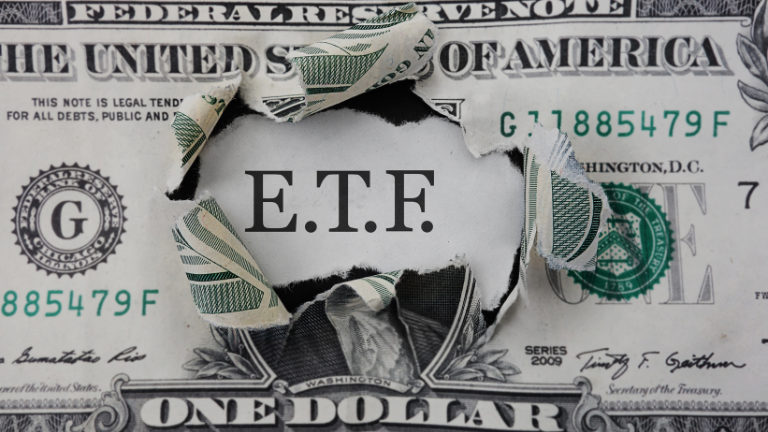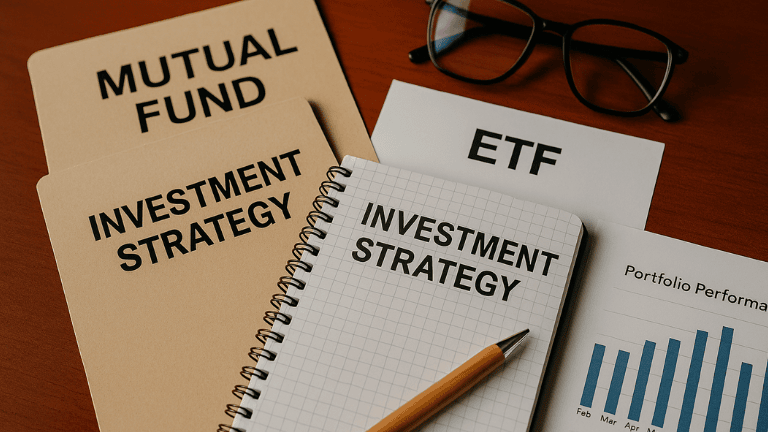ETFs vs. Mutual Funds: What’s the Real Difference?
Why This Matters
When it comes to building a smart, diversified portfolio, knowing whether to invest via ETFs vs. mutual funds can make a significant difference. These two investment vehicles share many core features. They are both pooled investments managed under the Investment Company Act of 1940, offer exposure to a range of assets, and cater to different risk and strategy preferences.
But while they are similar in concept, the nuances matter. From trading flexibility to cost, tax efficiency, and suitability for beginners, understanding how ETFs and mutual funds differ can help you make informed decisions and potentially save you money along the way.
Today we will cover:
What ETFs and mutual funds actually are
Their key differences and similarities
Pros and cons of each, including insights not always covered in mainstream articles
A detailed FAQ to answer your most common questions
Listen Now: iTunes | Spotify | iHeartRadio | Amazon Music
What Is a Mutual Fund?
A mutual fund pools money from many investors and is managed by a professional or team that buys a diversified portfolio of securities such as stocks, bonds, or other assets based on a stated investment objective.
Key features of mutual funds:
Pricing and transactions: Priced once per day, after the market closes. This price is called the Net Asset Value (NAV). No matter when you place your order during the trading day, you receive that end-of-day price.
Fees and expenses: May include management fees, distribution (12b-1) fees, and potentially loads, either front-end (paid when buying) or back-end (paid when selling).
Minimum investment: Often designed for small or starter accounts. You can invest small amounts like $100 without worrying about buying full shares.
What Is an ETF?
An ETF, or Exchange Traded Fund, is also a pooled investment vehicle, but it behaves more like a stock in how it is traded.
Key features of ETFs:
Intraday trading: You can buy or sell ETF shares any time during market hours, and prices change live based on supply and demand.
Trading strategies: ETFs allow use of limit orders, stop orders, margin, short-selling, and even options in some cases.
Cost structure: Generally, there is no load, and expense ratios tend to be lower, especially for index-based ETFs, though some specialty ETFs may have higher fees.
Tax efficiency: The in-kind creation and redemption mechanism allows ETFs to avoid triggering taxable capital gains within the fund structure.
Side-by-Side Comparison: ETFs vs. Mutual Funds
Trading
Mutual Funds: Once per day at Net Asset Value (NAV).
ETFs: Intraday trading like stocks
Fees
Mutual Funds: May include loads, management, and 12b-1 fees
ETFs: Generally lower expense ratios and no loads
Minimum Investment
Mutual Funds: Often low, ideal for starter accounts
ETFs: Need full shares, though fractional trading is becoming more common
Tax Efficiency
Mutual Funds: Can trigger capital gains distributions
ETFs: In-kind mechanism reduces tax drag
Trading Features
Mutual Funds: Limited flexibility, trades only at NAV
ETFs: Flexible, allow limit orders, margin, and options
Transparency
Mutual Funds: Holdings disclosure may be delayed
ETFs: Typically disclose holdings daily
Best For
Mutual Funds: Small accounts, automatic investing, beginners
ETFs: Active traders, tax-sensitive investors, niche exposure
When to Pick ETFs and When Mutual Funds Fit Better
Choose ETFs if you:
Want real-time price control and use trading tools like limit orders
Are tax-conscious, especially in taxable accounts
Seek inexpensive access to niche or thematic strategies
Prefer daily transparency on fund holdings
Choose Mutual Funds if you:
Are building an account with small contributions, such as $100
Prefer simplicity and automatic investing
Are limited by retirement plans that only support mutual funds
Value the stability of once-per-day pricing
Hidden Costs and Risks to Know
ETFs may incur bid-ask spreads and sometimes trade at premiums or discounts to NAV. Liquidity matters, since thinly traded ETFs can cost more.
Mutual funds may carry loads or 12b-1 fees, which can reduce returns, especially in actively managed funds.
Behavioral risks: Some investors misuse ETFs by trading too often, which can reduce returns compared to buy-and-hold strategies.
FAQs: ETFs vs. Mutual Funds
Which is more cost-effective, ETFs or mutual funds?
ETFs generally have lower expense ratios and better tax efficiency, but certain mutual funds, especially institutional share classes, can be competitive.
Can ETFs reduce tax liabilities compared to mutual funds?
Yes. ETFs use an in-kind redemption process that helps avoid capital gains distributions, making them more tax-efficient than most mutual funds.
Are mutual funds better for small investors?
Often yes. Mutual funds let small investors start with minimal amounts without needing to buy full shares, which is ideal for new accounts or smaller contributions.
Can I use stop-loss or limit orders with mutual funds?
No. These tools are available only with ETFs because mutual funds transact only at end-of-day NAV.
Is one inherently safer than the other?
Neither structure is inherently safer. Safety depends on the underlying investments. However, mutual funds may feel less volatile because they do not trade intraday.
Are actively managed ETFs and mutual funds the same?
Yes, both can be actively managed. ETFs now include many actively managed strategies, though mutual funds are still more common in this category.
Can investors lose out by switching to ETFs?
Possibly. ETFs offer cost and tax benefits, but overtrading and poor timing decisions can hurt returns compared to long-term holding in mutual funds.
Do ETFs or mutual funds pay dividends?
Yes. Both ETFs and mutual funds can pay dividends if the underlying securities generate income. With ETFs, dividends are usually paid quarterly. Mutual funds may distribute dividends monthly, quarterly, or annually depending on the fund.
Can I buy ETFs in my 401(k)?
Most 401(k) plans do not allow direct ETF purchases. They typically offer mutual funds instead. However, if your 401(k) has a brokerage window, you may be able to access ETFs.
Which is better for retirement accounts?
Both can be appropriate. Mutual funds often dominate retirement plans because of their automatic investment features, while ETFs may offer better tax efficiency in taxable accounts.
Do ETFs have minimum investments?
No official minimums exist for ETFs, but you must buy at least one share (unless your broker allows fractional share investing). Mutual funds often have minimum investments ranging from $100 to $3,000.
Which has more options available, ETFs or mutual funds?
There are more ETFs and mutual funds combined than individual stocks on the U.S. exchanges. ETFs have grown rapidly and now offer thousands of strategies, from index funds to niche thematic investments.
Do ETFs or mutual funds have better performance?
Neither structure guarantees better performance. Returns depend on the fund’s strategy, management, and underlying assets. However, ETFs often outperform similar mutual funds after fees and taxes.
Can I dollar-cost average into ETFs?
Yes, but it may require your broker to support automatic investing in ETFs. Mutual funds are generally easier for dollar-cost averaging since they allow automatic contributions.
Which is better for beginners?
Mutual funds are often considered beginner-friendly due to their simplicity and automatic investment options. ETFs may appeal more to investors comfortable with brokerage accounts and trading.
Do ETFs ever close or shut down?
Yes. If an ETF does not attract enough assets, the provider may close it. Investors receive cash for their shares. Mutual funds can also close, though it is less common.
Are ETFs always cheaper than mutual funds?
Not always. While ETFs are often cheaper, some ultra-low-cost mutual funds rival ETFs on fees. Always compare expense ratios before deciding.
Can I trade ETFs after hours?
Yes. Many brokers allow ETF trading in pre-market and after-hours sessions. Mutual funds cannot be traded outside of standard market hours.
Do ETFs or mutual funds have commissions?
Most brokers today offer commission-free trading for ETFs and no-load mutual funds. However, some funds may still have transaction fees or loads.
Which is better for tax-advantaged accounts like IRAs?
Both can work well. Since taxes are deferred in IRAs, the ETF tax advantage is less important, so either structure can be suitable depending on investment goals.
Choosing What’s Right for You
ETFs and mutual funds share the same purpose: to help investors diversify with a single investment. The main differences are in trading flexibility, costs, tax treatment, and suitability for different types of investors.
ETFs are often best for those who want flexibility, low costs, and tax efficiency.
Mutual funds are often better for beginners, small accounts, or investors who want simple, automated investing.
The smartest move is to understand both options and choose what fits your strategy and goals.
Next Steps
Understanding the differences between ETFs vs. mutual funds is a great start, but the real question is how they fit into your financial plan. The right mix depends on your goals, your timeline, and the bigger picture of your financial life.
At Bonfire Financial, we help clients cut through the noise and build portfolios that actually work for them. If you are unsure whether ETFs or mutual funds are the right choice, or simply want a second opinion on your current strategy, we are here to help.
👉 Schedule a call with us today and get personalized guidance on your investments. A 15-20 minute conversation could help you save on costs, avoid common mistakes, and feel more confident about your financial future.
 Client Login
Client Login


